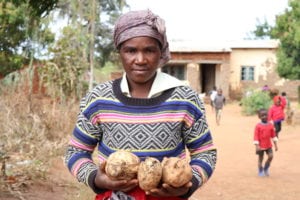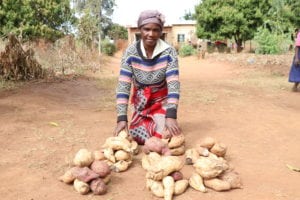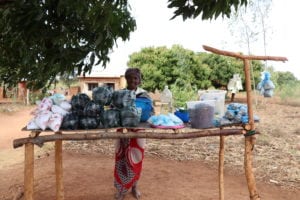During my trip this past summer in Malawi, I had the privilege to meet with Mrs. Chimenya from the Kalupe Village. A VIP staff member mentioned she had tremendous success with conservation farming practices she learned from Villages in Partnership. After hearing this news, Jordan Heinzel-Nelson and I made a visit to speak with her in person. We were both excited to hear about her success first-hand. As we pulled up to her house, we noticed she had a produce stand set up outside by the dirt road with a variety of vegetables and grains. This stand was a good sign since this meant she was making a form of income and had extra crops to sell.

As we approached her home, she came outside to greet us with a big smile on her face. She seemed so happy and full of life as she greeted us. We also met her children who eagerly accompanied her along with her husband after they heard of our arrival. Soon after we finished our greetings and introduced ourselves, a bamboo mat was laid out for us to sit on and spend time with the family. Jordan asked the translator if we could ask her some questions and she eagerly replied saying “yes”. We quickly learned a lot about Mrs. Chimenya and her family after asking a few questions about her life in the village.

She told us that after her husband suffered from a stroke, it was up to her to support them along with their 7 children. Her husband previously had a job with the government which kept them stable so this sickness was a shock for their family. On her own, she would only collect on average 8 bags of crops during harvest. After VIP provided her with conservation farming training, she doubled her harvest and was able to gather 15 bags of crops from her fields. With this abundance, she was able to sell the extra to pay for school fees for her children.

Mrs. Chimenya explained to us how conservation farming works for her crops. She was taught to use maize stalks similar to hay which prevent the immature crops from becoming damaged from the heat of the sun. This technique also helps to lock moisture into the soil and keep the ground from becoming dry. As the maize stalks decompose, they return nutrients into the soil. With this technique, she planted an assortment of crops including maize, cassava, sweet potatoes, and ground nuts. After talking to her and the family, she then showed us her fields where she does her work in addition to her stand in the front of the house. At the end of our visit, they brought us sweet potatoes to eat and showed so much gratitude for VIP’s work.


What a wonderful story on how VIP is helping families be successful!